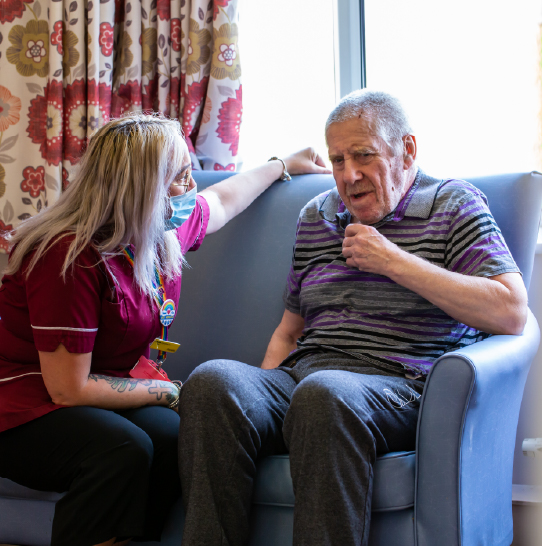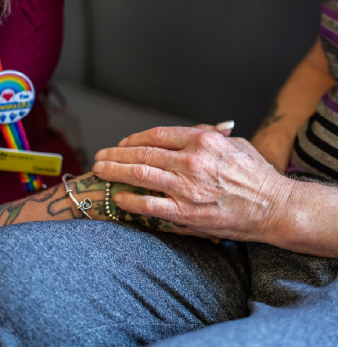Supporting the NHS.


We have been honoured to learn about and navigate through the pandemic and challenges that this has brought to us as a small healthcare service provider.
“It’s impossible to do in such a short space of time” is what we said when we were asked if we would be able to set up an intermediate care service to cater for the needs of those affected by COVID19. There was so much to consider, from staffing, PPE, clinical expertise and logistics of safely bringing people in to the service and supporting them to move on to their onward placements.
With the already growing pressures that the pandemic had brought to the job, it was the compelling words of the head of the leadership team; “it’s the right thing to do”, was what driven all of the subsequent efforts and initiatives.
We already had a gorgeous, newly refurbished unit which was completed to a high specification and had a real homely feel to it. We had to map all of the other pieces to the puzzle that would be required to provide a safe and comfortable alternative to those currently in hospital where we could care for people, help them to regain some independence and allow their loved ones to know where they were and that they were being looked after. At the time, hospitals were inundated with admissions and we were hearing from families that they were struggling to get in touch with the wards and receive updates about their loved ones.
The first thing we decided to tackle was the issue of staffing. As we had three nursing units open, we held meetings across the home and explained the current predicament to our staff team. It was purely voluntary if staff were willing to work on the Florence Unit. We actually held an expectation that nobody would want to work on a unit where everybody had COVID19. In actual fact, it was the opposite. The response that we had really floored us. People in the meetings raised their hands and we were flooded with people wanting to help. One of the staff members announced “If it was my family member, I would feel so much better knowing they were in a place like this. If it means we have to look after them, then we have to look after them”. At this time, anxieties were still very high around the home as there had not been many staff affected by COVID and it was still very much ‘the unknown’.
In addition to those already working within our service, we engaged a company who have a good reputation for providing excellent and skilled care staff on an ad-hoc basis. Following a discussion and explanation of our ambitious plan, Crown Care Services were ready at hand for our ‘go live’ day to provide experienced nurses with a varied range of expertise. This partnership was instrumental in the continued success of the unit. It provided a level of flexibility to consistently match the changing demands of the unit.
The next matter to address was processes. To do this, we had to acknowledge that our strengths lay in providing care for people in a long term settings, getting to know them inside out and forming therapeutic relationships which lead to positive outcomes for those using our service. How did we adapt this to a short stay intermediate care service which would not allow such a luxury to get to know people so well? We kept it simple. We decided not to re-invent the wheel. We looked at already well established and effective models of care. We had adapted the Roper, Logan and Tierney model with some additional domains to encompass all of the individuals care needs and to ensure that a person centred approach to all care needs.
Led by the Director of Nursing, a standard operating procedure was drawn up. This meant not only changes to our normal procedures from referral to discharge but also the added considerations to unexpected issues such as footwear, aerosol generating procedures, identification, additional training for staff and safeguarding measures for people at their most vulnerable time. This was unchartered territory for us as well as the external parties who were involved. Never the less, this was reviewed by all stakeholders across the city and unanimously approved.
Following on from this we had to look at what help we needed and what help was available. Well, the help was there in abundance. We had clinical and operational input from Clair Priestley, the Modern Matron for Community Response Services in Manchester. This meant we had a direct line to access a range of community services which only maximised the rehabilitation potential for those using the service. Clair’s contacts coupled with her ‘no limits’ approach meant any barriers to care provision were immediately wiped out. This opened doors to a plethora services that were previously inaccessible to a nursing home but evidently were of great benefit to those using the service. We also had expert clinicians from the Go to Docs service, led by Sharon Collins, Clinical Lead, who provided ongoing support and management of those who were acutely unwell and requiring intervention. It was clear that this team were invested in the welfare of those using the service and demonstrated innovation in healthcare by using various technological platforms and mediums to ensure the outcomes for those they were looking after was the overriding driver as well as prioritising safety. The quick turnaround of people on the unit was not something we were used to at Moston. This meant that adaptations were needed to our systems for medicines management and we had to ensure that clinical governance and the welfare of those on the unit was paramount. This is where Brett came in. Brett Finch, Project Lead for the Medicines Optimisation in Care Homes stepped up to take charge of this and developed his own custom tailored Standard Operating Procedure which significantly promoted a person centred approach to medication management. It had clear protocols which factored in safety measures and checking to ensure that medication was reconciled and reviewed.
Equipment and PPE was the next hurdle to cross. This was done in collaboration with our normal suppliers and Manchester City Council. There had been a national shortage for obvious reasons and sourcing this had proved difficult. Our suppliers were briefed on our upcoming venture and were moved by the notion to the point where they advised we had been identified as a key client, meaning they would make every effort to meet the demand and supply all we needed to safely execute our plan. It is safe to say that they went above and beyond by being creative with deadlines on placing next day delivery orders and members of their sales team dropping off equipment on their way home to ensure we never ran short of things we needed.
We have profited from a wealth expertise from our external partners but also the determination and resilience of our own staff team which truly resulted in a recipe for success with this venture. We have been honoured to learn about and navigate through the pandemic and challenges that this has brought to us as a small healthcare service provider but also to do it in conjunction with the larger care organisations such as the NHS, MLCO and MHCC. We have benefited from this experience and are proud to have been part of a project which led to significant positive outcomes for individuals and loved ones of those who used The Florence Unit.
Related Articles
Effective Care Planning Within an Inpatient Setting
Successful treatment of mental health requires a patient centred and holistic approach to treatment. One way of ensuring treatment is, in fact, patient centred is with the implementation of joint care plans. Today we will be taking a closer look at what a care plan is and how you can implement it effectively within an inpatient setting. What is a Care Plan? Before we discuss the formation of a care plan within your service, we must first define a care plan and what it means in the...
Optimising Staffing in Female Personality Disorder Units
Care Quality Commission (CQC) KLOE 's are a set of standardised guidelines to assess the effectiveness, safety, and quality of healthcare settings. The Caring domain ensures that services are effective in treating patients with compassion, respect, and empathy. One of the key considerations under this domain for mental health inpatient services caring for females diagnosed with personality disorders is staffing. The Cochrane Systematic Review (Bowers et al, 2014) offers evidence to support the...
Dignity and Respect: A Mindful Consideration for Mental Health Professionals
It is every person’s fundamental right to be treated with dignity and respect, to have their wants and preferences recognized, and to have all that contributes to their perceived well-being, acknowledged. At Equilibrium Healthcare we make this one of our most fundamental core values and practices. But what is dignity and respect? And how can we as mental health professionals ensure that these rights are nurtured and maintained within a care home setting? Today we will be discussing...





